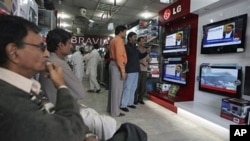State Department officials in Washington are acknowledging that the WikiLeaks publication of thousands of classified diplomatic documents is making life more difficult for diplomats, even though U.S. Secretary of State Hillary Clinton has said the release will not interfere in any way with U.S. diplomacy efforts.
State Department Spokesman P.J. Crowley told reporters in Washington Thursday that Secretary Clinton has made a number of phone calls in recent days to express regret for the release of classified State Department cables.
"On Friday she talked to China, Germany, France, the U.K., Afghanistan and Saudi Arabia," said P.J. Crowley. "On Saturday, she talked to Canada. On Sunday, she talked to China again. "
And, Crowley said, in the past week Clinton has met with a number of her counterparts and made other phone calls, most recently to the presidents of Pakistan and Argentina, and a call earlier this week to the president of Liberia.
Clinton departed on a diplomatic trip to the Near East, Central Asia and Bahrain on Monday, the day after the WikiLeaks release began. Speaking in Kazakhstan Wednesday after a day of diplomatic meetings, Clinton said the massive leak would not interfere with diplomatic efforts.
" I have not had any concerns expressed about whether any nation will not continue to work with and discuss matters of importance to us both, going forward," said Hillary Clinton.
But, as Crowley pointed out at the State Department Thursday, officials in foreign capitals are now delving into the documents. Some cables reportedly contain less-than-flattering descriptions of world leaders' personal and professional lives.
"Countries, depending on what they've seen and what they've read, are reacting," he said. "We anticipate that for a period of time, some government officials that have talked to us freely in the past may be more reluctant. "
Crowley said diplomatic outreach is continuing, from high-profile calls placed by the secretary of state down the ranks to the deputy secretary, ambassador and counselor level at embassies around the world.
State Department officials have emphasized that policy is made in Washington and not in the diplomatic messages that are sent from embassies to the U.S. capital. They say the best way to evaluate U.S. policy is to look at U.S. policy and not candid cables.
WikiLeaks continues to release documents in batches, ensuring that the issue will not just blow over. For instance, a classified cable released Wednesday refers to Moscow as a "kleptocracy."
The State Department says it will not comment on what it says are alleged to be State Department cables, but Crowley acknowledged that people are indeed reacting negatively to the content of those messages.
" This is having an effect," admitted P.J. Crowley. "Undersecretary Bill Burns was on the Hill yesterday [Wednesday] and he made clear that this is going to make the conduct of diplomacy for a period of time more difficult. I mean, for human nature reasons, if none other. You know, we're not happy at the release of these documents, and I have no doubt that countries and leaders looking at the documents out of context are not happy, as well. "
Secretary of State Clinton is expected to continue conversations about WikiLeaks when she meets with counterparts in Bahrain.
Diplomats Feel Fallout After WikiLeaks Release




